 "Bobik" A Tunnel Diode 80m CW Transmitter by AA1TJ "Bobik" A Tunnel Diode 80m CW Transmitter by AA1TJ
Bobik is an 80m CW transmitter built from a pair of (circa-1976) Soviet-made tunnel diodes. The circuit is a push-pull LC oscillator; frequency-locked to a quartz-crystal.
http://web.archive.org/web/20101124023645/http://aa1tj.com/Bobik.html
|
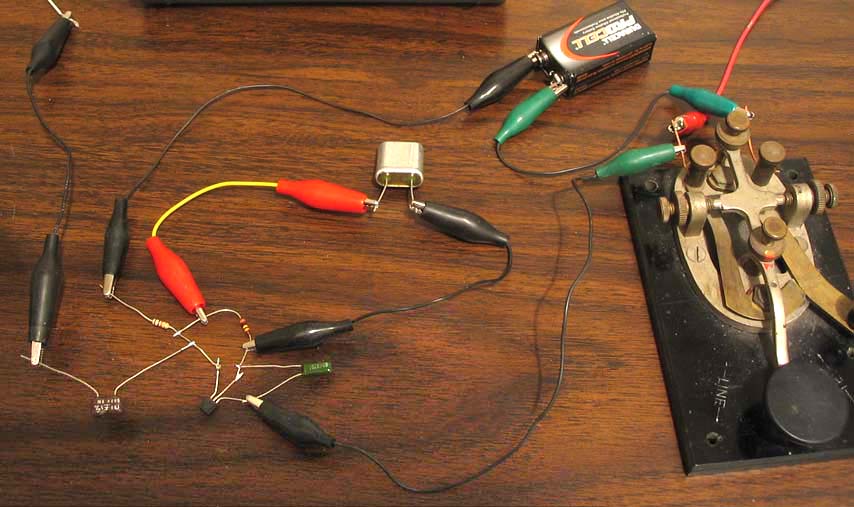 "Easy Ten" - A simple 80 Meter CW Transmitter Using A 2N3904 by K7NS "Easy Ten" - A simple 80 Meter CW Transmitter Using A 2N3904 by K7NS
I call this very simple transmitter the "Easy Ten" because it can be easily heard at a distance of 10 miles. Transmitter antenna is a random length wire run through a hole in the wall and thrown into a tree.
http://www.sparkbangbuzz.com/easy-ten/easy-ten.htm
|
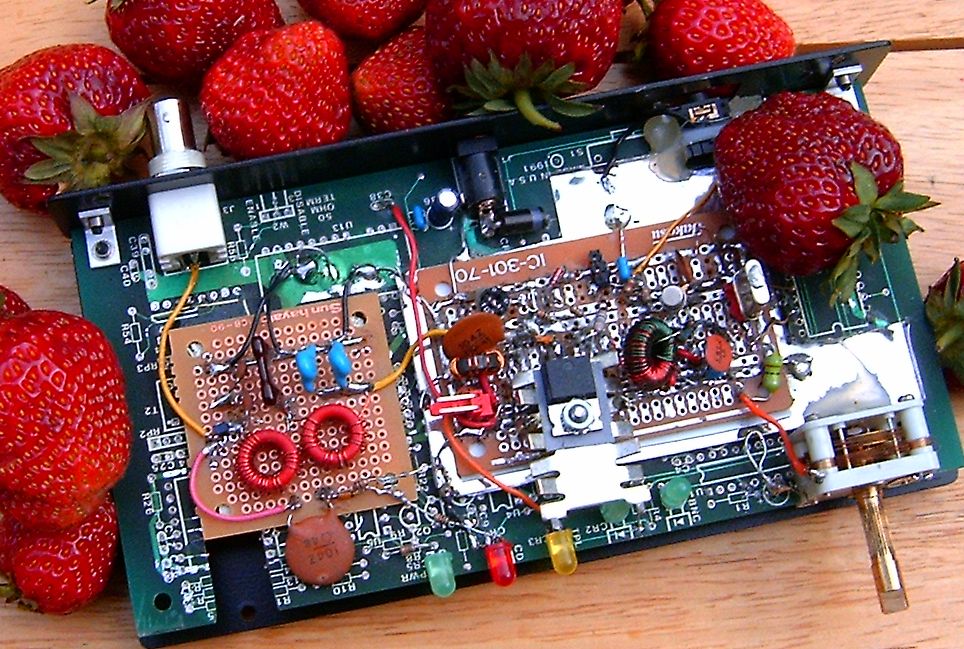 25 part transmitter for the QRP Minimal Art Session by LA3ZA 25 part transmitter for the QRP Minimal Art Session by LA3ZA
My Minimal-Art-Session rig shown here was made for class B of the QRP-MAS competition which is in May every year. In class B the transmitter should have a maximum of 50 components, and the fewer the number of components, the more points one will get per contact. With such simple rigs, only CW is viable.
https://la3za.blogspot.com/2005/12/25-part-transmitter-for-qrp-minimal-art.html
|
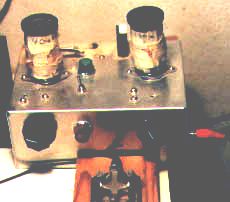 3-Watt, 2-Band CW Transmitter by KC6WDK 3-Watt, 2-Band CW Transmitter by KC6WDK
More ambitious, versatile, and powerful than the 500mW Transmitter is this enjoyable version of a unit that originally appeared June 1967 in QST. A two-stage crystal-controlled rig for 80- and 40-meter CW operation.
https://www.qsl.net/kc6wdk/QRP/transmitter2.htm
|
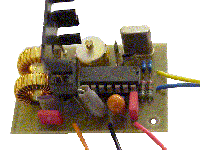 3.5MHz ARDF Transmitter by ON7YD 3.5MHz ARDF Transmitter by ON7YD
This transmitter is designed as a classic 3 stage TX.
http://www.qsl.net/on7yd/atx80.htm
|
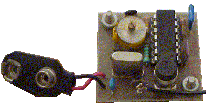 3.5MHz Low PowercARDF Transmitter by ON7YD 3.5MHz Low PowercARDF Transmitter by ON7YD
This low power transmitter is developed for ARDF exercising purposes but of course can be used as super QRP transmitter either.
http://www.qsl.net/on7yd/minitx80.htm
|
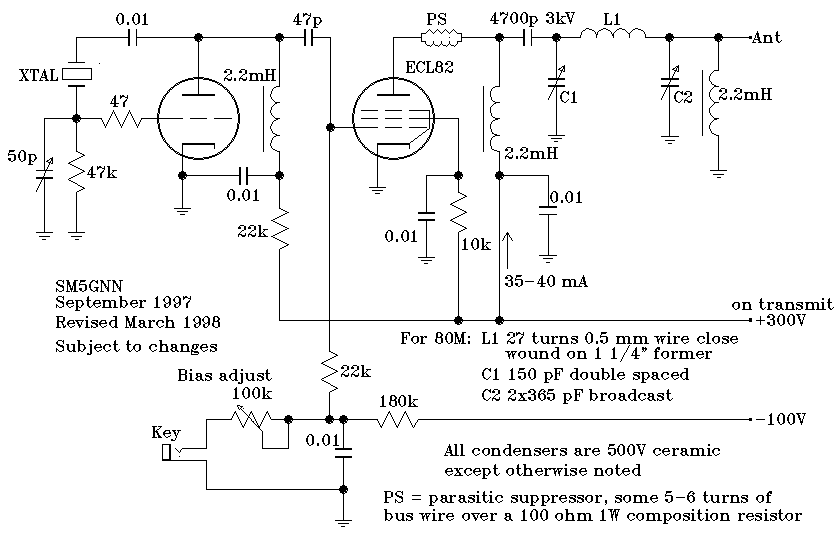 80 Meter Tube Transmitter by SM5GNN 80 Meter Tube Transmitter by SM5GNN
This is a variation of the triode/pentode family of glowbug transmitters. It features a Pierce oscillator which runs continously during transmit to avoid chirp.
http://www.tuberadio.com/80.html
|
 80 Metre DSB Transmitter by VK3YE 80 Metre DSB Transmitter by VK3YE
This circuit is probably the simplest practical 'bare-bones' voice transmitter for the 3.5 MHz amateur band.
http://home.alphalink.com.au/~parkerp/projects/proj80ds.htm
|
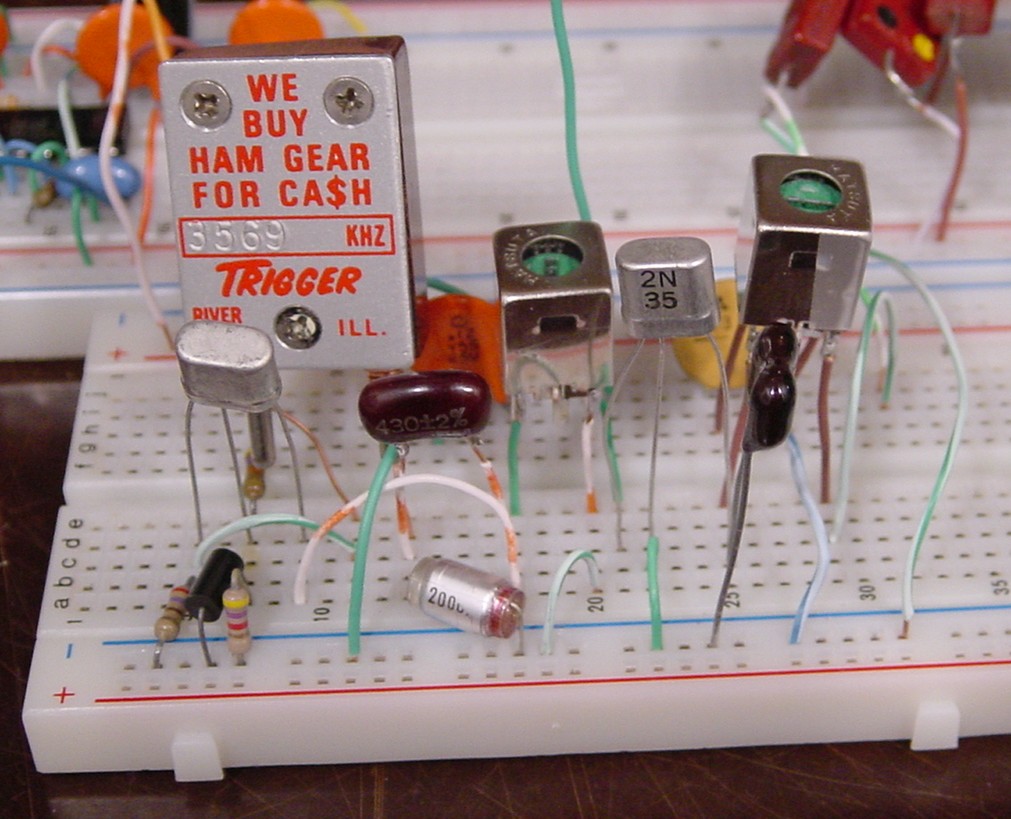 80m "1950's Retro" QRP Transmitter by AA1TJ 80m "1950's Retro" QRP Transmitter by AA1TJ
A "milliwatting" enthusiast enjoys the challenge of communicating on the amateur radio bands while using the lowest possible RF power level. However, along with this challenge, I've recently begun to wonder what are the minimal performance limits of the active devices that I use in my QRP transmitters?
http://web.archive.org/web/20101124023608/http://aa1tj.com/80mqrptransmitter;circa1955.html
|
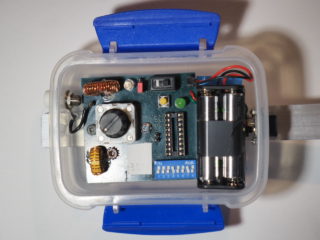 80m 0.5w Mini Transmitter by G3ZOI 80m 0.5w Mini Transmitter by G3ZOI
This 80m ARDF transmitter was designed to be multi purpose, suitable for Classic, Sprint and FoxOring formats. Compact and lightweight and easy to deploy. Low component count.
Multipurpose socket for charging/syncro/tune-up. Internal ATU for matching to a short wire antenna.
http://open-circuit.co.uk/wp/transmitters/mtx80/
|
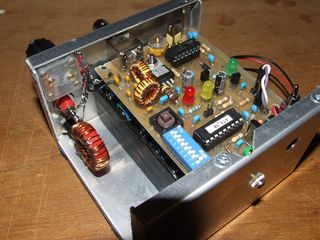 80m 3W Transmitter ATX-80 by G3ZOI 80m 3W Transmitter ATX-80 by G3ZOI
The 80m TX described here is the well known ON7YD ATX-80 and timer, combined in a standard aluminium enclosure.
http://open-circuit.co.uk/wp/transmitters/mtx80/
|
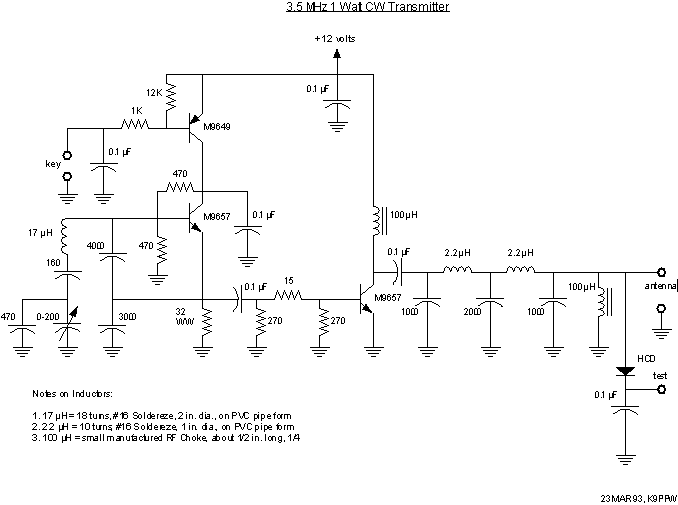 80-meter CW Transmitter by K9PPW 80-meter CW Transmitter by K9PPW
This is a schematic of Bob's homebrew QRP transmitter. It's CW on 80 meters, about 1 watt output, VFO ... and only uses TWO rf transistors and one more for keying. It was built as an experiment to see what you could get out of ONE transistor (about 250 mw with no chirp) and the "shoes" were added later to get a whopping one watt of rf out.
http://my.core.com/~jematz/qrp/k9ppw-s1.htm
|
 80m Fuchsjadsender mit optimaler Antenne durch DL2AVH 80m Fuchsjadsender mit optimaler Antenne durch DL2AVH
- einfacher und schneller Aufbau im Gelände
- einfache Antenne , 2m – Installationsrohr
- Fuchsjadsender Pout = 2 Watt
http://www.a09.info/Fuchs_Ant.pdf
|
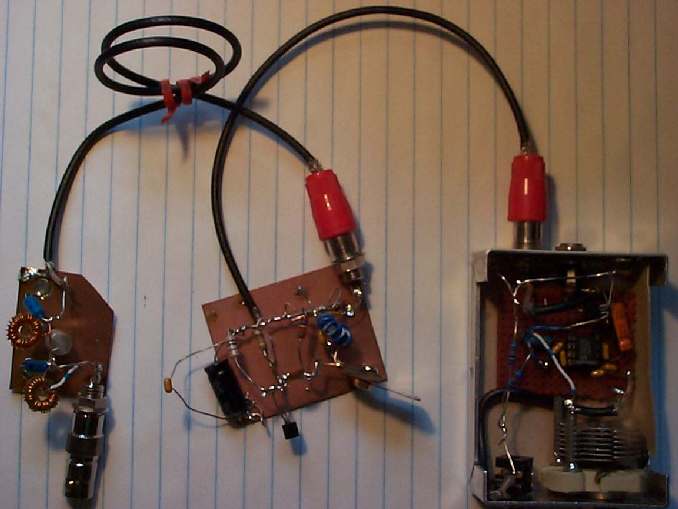 A Simple Modular DSB TX by GMØRWU A Simple Modular DSB TX by GMØRWU
The simplest way of getting on the air with phone is to convert a single transistor crystal controlled TX into an AM transmitter by putting a carbon mike in series with the poer supply. A more elegant approach is to use DSB.
http://www.homepages.ed.ac.uk/jwp/radio/projects/dsb/
|
 Built an 80m DSB transmitter - VK3XU's "simplex sidebander" by VK2TPM Built an 80m DSB transmitter - VK3XU's "simplex sidebander" by VK2TPM
Spurred on by the success and what I've learned from my battle with the Bitx20 I sat down and constructed a transmitter from scratch.
It's the "simplex sidebander" from Drew Diamond's "Radio projects for the amateur" first book.
http://blog.marxy.org/2009/01/built-80m-dsb-transmitter-vk3xu.html
|
 Das Derelicht An 80m CW Transmitter by AA1TJ Das Derelicht An 80m CW Transmitter by AA1TJ
This electronic puzzle was a result of my changing a defective compact fluorescent lamp (CFL) in my kitchen. For some reason, I began to wonder if it would be possible to build a QRP CW transmitter using the electronic components salvaged from this derelict lamp.
http://web.archive.org/web/20101124023947/http://aa1tj.com/dasderelicht.html
|
 El Silba Voice-Powered 75m DSB Transmitter by AA1TJ El Silba Voice-Powered 75m DSB Transmitter by AA1TJ
This double-sideband (DSB) radiotelephone transmitter is powered entirely by the instantaneous (not stored) energy produced in the operator's voice. The RF output power in my prototype falls within the range of 5 to 15mW.
http://web.archive.org/web/20101124023634/http://aa1tj.com/elsilbo.html
|
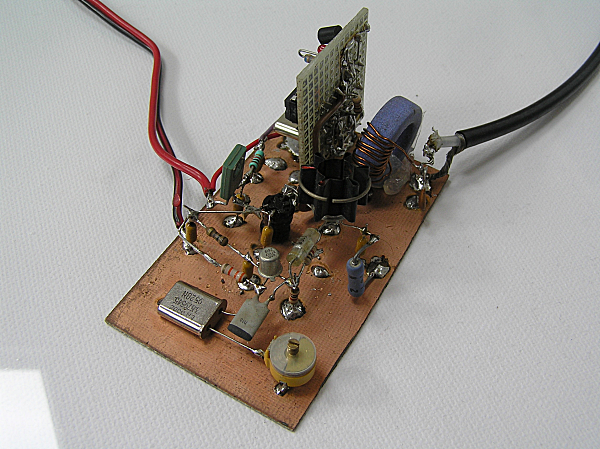 Fox transmitter for 80m by PA3HCM Fox transmitter for 80m by PA3HCM
One of the members at the club pointed me at the so-called “OXO transmitter”. I looked it up at the internet, and immediately liked its simplicity. So I started to build it.
http://www.pa3hcm.nl/?p=294#more-294
|
 Frequency agile 80 metre CW QRP transmitter by VK3YE Frequency agile 80 metre CW QRP transmitter by VK3YE
http://home.alphalink.com.au/~parkerp/projects/pro80cw.htm
|
 Fuchsjagdsender - Der kleine Fox durch DL1DMW Fuchsjagdsender - Der kleine Fox durch DL1DMW
Wer schon einmal an einer Fuchsjagd teilgenommen hat, weiß, wie viel Spaß sie bereiten kann. Für die Fuchsjagden des Ortsvereins Soest, wurde dieser wenig aufwendige 80-m-Fuchs aus zwei vorhandenen Lösungen kombiniert.
http://www.amateurfunkbasteln.de/fox/fox.html
|
 Micro beacon " Froggie" by OH1TV Micro beacon " Froggie" by OH1TV
This radio transmitter is just for fun. It sounds like a frog when it gives short signals on 3699kHz LSB every second or two.
Transmitting power is very small, less than 1mW. Useful tranmission distance is less than 50m.
Power consumption is very low. One LR20 battery (large 1.5V) can last more than a year.
http://www.kolumbus.fi/pekka.ketonen/Froggie.htm
|
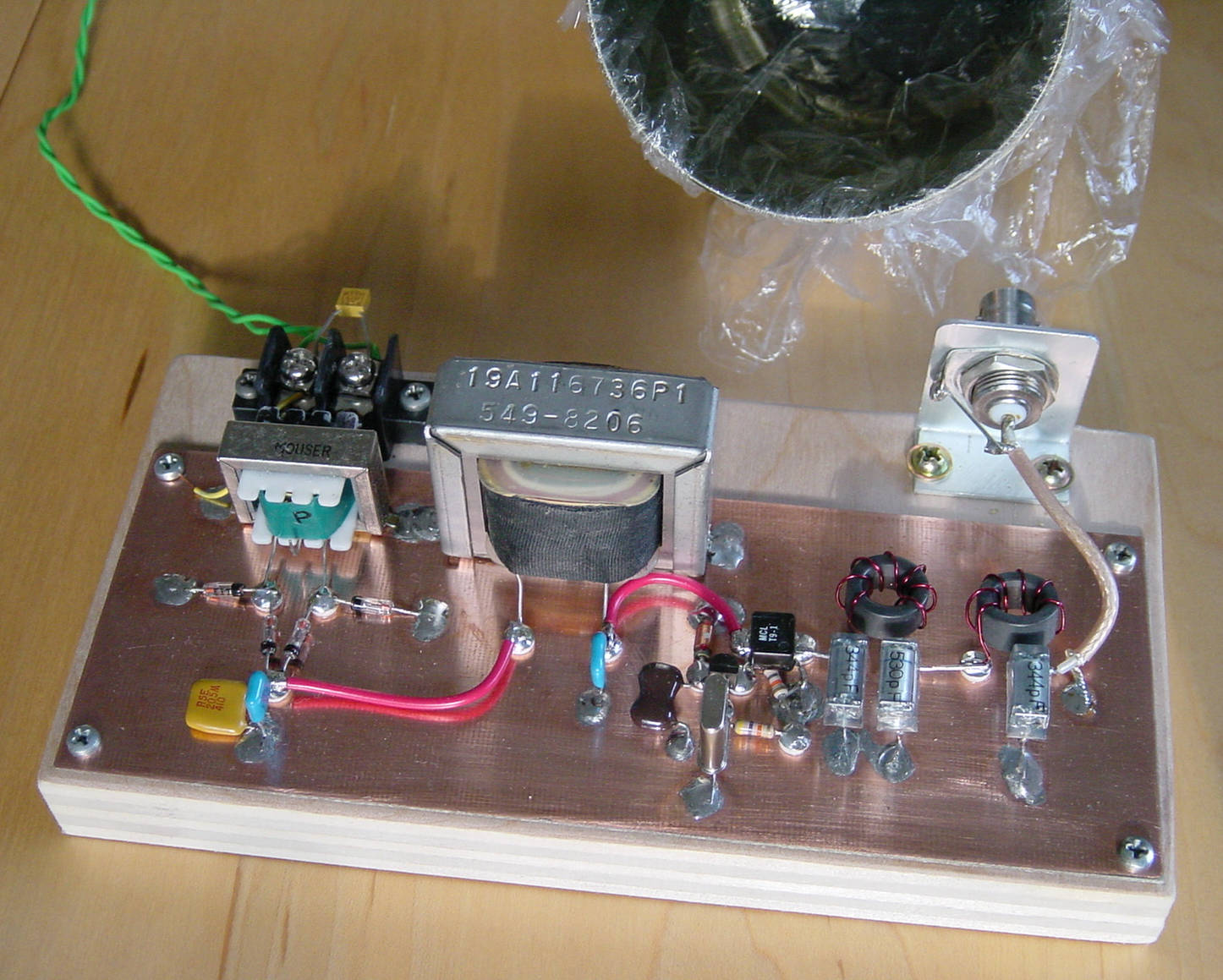 New England Code Talker by AA1TJ New England Code Talker by AA1TJ
In order to complete my first QSO with El Silbo I resorted to sending Morse code, by literally speaking "DIT DAHHH DIT," etc., into the loudspeaker (working backwards as an acoustic to electical power generator). This gave me the idea to build a dedicated voice-powered CW transmitter. I call this CW transmitter the New England Code Talker.
http://web.archive.org/web/20101124023547/http://aa1tj.com/newenglandcodetalker.html
|
 OARC-80 by WAØITP OARC-80 by WAØITP
This is a fun little QRP transmitter that was developed for a club project. I had wanted to try an oscillator on a chip, but had heard the Epson chips had phase shift problems.
http://www.wa0itp.com/oarc80.html
|
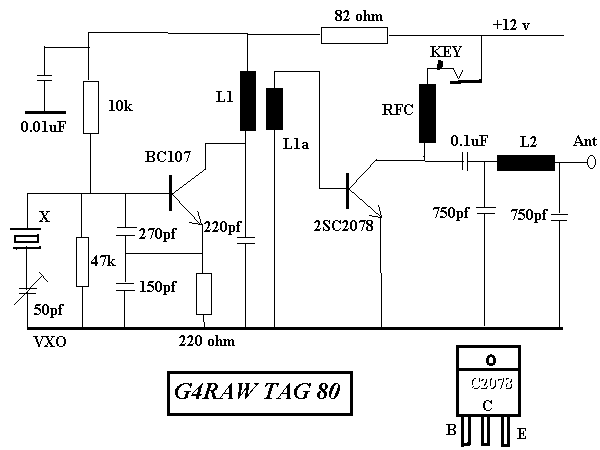 TAG 80 Transmitter by G4RAW TAG 80 Transmitter by G4RAW
Original Circuit in SPRAT Summer 1994 Iss Nr 79
The original version was built on tag strip, hence the name.
http://www.qsl.net/g3pto/g4raw.html
|
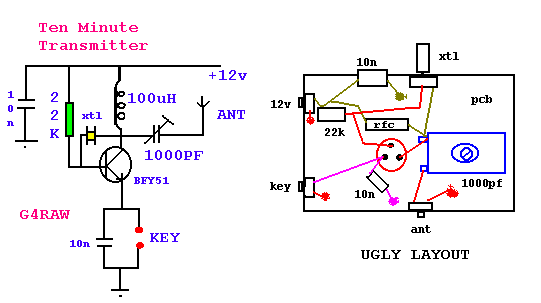 Ten Minute Transmitter by G4RAW Ten Minute Transmitter by G4RAW
Steve, G4RAW described this simple transmitter for 80 metres in Sprat 82 and describes how the World record for building a rig , actually a Oner, and having a QSO, is under 15 minutes.
http://www.zerobeat.net/g3ycc/tenmin.htm
|
 The AA8V/W8EXI 6CL6 One-Tube Transmitter by AA8V The AA8V/W8EXI 6CL6 One-Tube Transmitter by AA8V
In December, 1998 I attended the annual Christmas banquet of the Cuyahoga Falls Amateur Radio Club. At that meeting I got a wonderful Christmas present: Jim Trutko, W8EXI, offered to give me much of his old homebuilt ("homebrew") amateur radio equipment.
https://www.frostburg.edu/personal/latta/ee/6cl6xmtr/6cl6xmtr.html
|
 The Madagascar Mighty Mite by 5R8SV The Madagascar Mighty Mite by 5R8SV
Over the last few years, there have been a spate of postings from homebrewers taking inspiration from the Soldersmoke podcast to whip up various incarnations of the Michigan Mighty Mite, a very simple rock-bound QRPp transmitter.
http://blog.templaro.com/madagascar-mighty-mite/
|
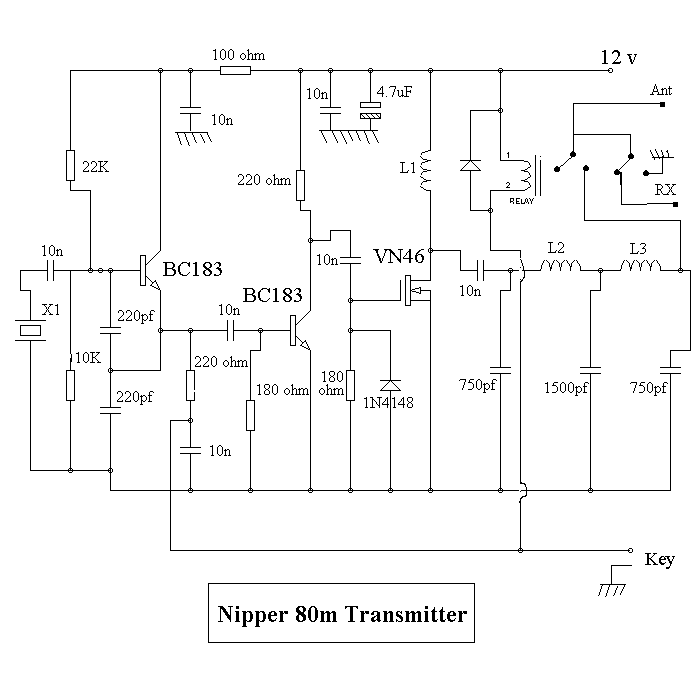 The Nipper 3.5MHz Transmitter The Nipper 3.5MHz Transmitter
I think that this circuit was developed by G3ROO but my notes are lacking in this information.
http://www.qsl.net/g3pto/nipper.html
|
 The Vermont Snowflake by AA1TJ The Vermont Snowflake by AA1TJ
The Snowflake is built around a 7400 TTL NAND integrated circuit. Two gates comprise the VXO and the other two gates are connected in parallel to form the PA. A 3.58MHz ceramic resonator is used in the VXO circuit.
http://web.archive.org/web/20101124023340/http://aa1tj.com/80mqrpp.html
|
 Tunnel Diode Transmitter by AA1TJ Tunnel Diode Transmitter by AA1TJ
It's now clear to me why nearly all of the 1960's tunnel diode novelty transmitters were designed for phone rather than CW.
http://web.archive.org/web/20101124023235/http://aa1tj.com/tunneldiodetransmitter.html
|
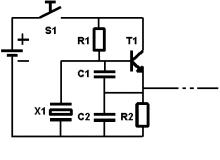 Your first transmitter by PA3HCM Your first transmitter by PA3HCM
With just a few components, you can make your own morse code transmitter. The output is only a few miliwatts, but this is enough to receive on any radio in your home.
http://www.pa3hcm.nl/?m=200208
|

 VLF Projekten
VLF Projekten





 Bezoekers
Bezoekers





























 Boven
Boven 
